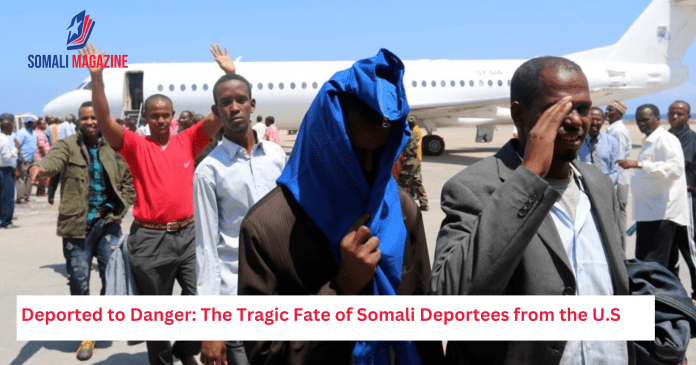Facebook Twitter (X) Instagram Somali Magazine - People's Magazine
How U.S. Immigration Policies Are Forcing Individuals into Conflict, Instability, and a Homeland They Barely Know
The story of Mukhtar and Anwar, two Somali men deported from the U.S. back to a homeland they barely knew, is a tragic testament to the harsh realities of immigration policies and deportation. Their experiences shed light on the struggles faced by deportees who are forced to return to a country ravaged by conflict, instability, and limited opportunities.
Mukhtar, who had lived in the United States since childhood, was deported to Somalia in 2017 after serving time in prison. Despite having spent most of his life in the U.S., he was sent back to a nation he had little connection with. Upon arrival, he faced immediate difficulties, including language barriers and a lack of resources. With no support system in place, he struggled to adjust, facing discrimination for being perceived as an outsider in his supposed homeland. He was ultimately killed in Somalia—a stark and tragic reminder of the dangers faced by deportees who are sent to unstable regions.
Anwar, another deportee, had a similar experience. He had spent most of his life in the U.S. but was deported to Somalia despite its volatile conditions. In his case, the challenges of reintegration were just as severe, as he was unfamiliar with the culture and had no means of livelihood. Like Mukhtar, he faced stigma from locals who viewed deportees as foreigners rather than fellow Somalis. Many deportees find themselves trapped in limbo, unable to rebuild their lives due to legal restrictions, lack of employment opportunities, and threats to their safety.
The irony in these deportations is that while the U.S. government acknowledges the dangers present in Somalia—often issuing travel warnings for its own citizens—it still forcibly deports individuals there. This contradiction raises serious ethical and humanitarian concerns about the deportation policies in place. Deportees, many of whom have spent the majority of their lives in the U.S., often have no ties to Somalia beyond their birthright. They are expected to survive in an environment that is entirely foreign to them, with little to no assistance from either the U.S. or Somali governments.
The challenges faced by deportees extend beyond personal struggles; they are also systemic. The lack of legal protection, social integration programs, and employment opportunities makes it nearly impossible for these individuals to successfully reintegrate into Somali society. Many are left homeless, unemployed, and vulnerable to crime and extremist groups who exploit their desperation. In some cases, deportees become targets for recruitment by militant organizations, further exacerbating security concerns in the region.
Moreover, the psychological toll of deportation is immense. Many deportees experience depression, anxiety, and post-traumatic stress disorder due to the sudden uprooting from their lives in the U.S. The feeling of being abandoned by the only home they knew, coupled with the struggle to survive in an unfamiliar land, leads to a sense of hopelessness and isolation. Some deportees resort to desperate measures, including attempting to flee Somalia by any means possible, even if it means risking their lives again.
The plight of Somali deportees underscores the need for a more humane approach to immigration policies. Rather than enforcing rigid deportation policies that place individuals in life-threatening situations, there should be greater consideration for their ties to the U.S. and the conditions of their countries of origin. Implementing support systems that assist with reintegration, providing legal pathways for individuals with strong community ties, and reassessing the risks associated with deporting individuals to dangerous regions are all necessary steps toward a more just immigration system.
Mukhtar and Anwar’s stories are not isolated incidents but part of a broader pattern affecting many deportees worldwide. The conversation surrounding immigration and deportation must take into account not just legal technicalities but also the moral responsibility of ensuring that individuals are not sent to their deaths. As long as deportation policies continue to overlook the real dangers faced by deportees, tragic stories like these will persist, leaving countless lives shattered in their wake.

